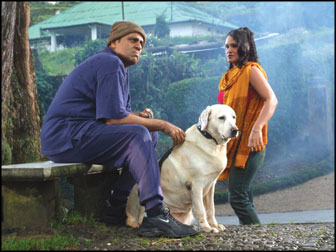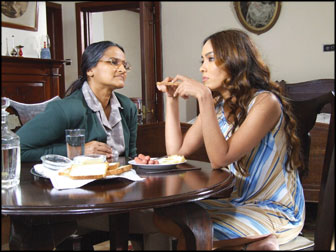|
Ekamath Eka Rateka:
A touch of psychology for Sinhala cinema
By Premaranjith TILAKARATNE
Ekamath Eka Rateka, a film directed by Sanath Gunatilake - one of the
most distinguished stars in Sinhala cinema - is based on "For a Night of
Love" - a short story conceived by the unique French novelist Emile
Zola. Sanath has himself written the screenplay and he is also
performing the pivotal role in the film. Emile Zola who pioneered the
literary genre called "Naturalism" was born before the advent of Cinema
and as such his writings contained detailed physical descriptions in
addition to mental revelations of his characters. Human life - Zola
believed was the synthesis of hereditary and environmental influences.
Therefore, it is not an easy task for any filmmaker to translate such a
complexed work into an audio-visual cinematic experience. It is the
intention of this writer to discern how Sanath Gunatilake has fared in
his endeavour.
 Ekamath Eka Rateka is neither a film that evokes any emotional
content nor it is a romantic tale dealing with a love triangle. It is
neither a tragedy nor a comedy but a mixture of tragi-comedy depicting
an episode in the life of the three characters especially, their human
waywardness. While it has a slight resemblance to a Charlie-Chaplin
movie of the silent era, Sanath Gunatilake's odd movement of his limbs
also reflects the antics of comedian "Bean". These unusual
characteristics of the film raises it above an average entertainer. Yes,
"Ekamath Eka Rateka", is an attempt to delve into the psychology of
three individuals. Ekamath Eka Rateka is neither a film that evokes any emotional
content nor it is a romantic tale dealing with a love triangle. It is
neither a tragedy nor a comedy but a mixture of tragi-comedy depicting
an episode in the life of the three characters especially, their human
waywardness. While it has a slight resemblance to a Charlie-Chaplin
movie of the silent era, Sanath Gunatilake's odd movement of his limbs
also reflects the antics of comedian "Bean". These unusual
characteristics of the film raises it above an average entertainer. Yes,
"Ekamath Eka Rateka", is an attempt to delve into the psychology of
three individuals.
The sequence of events that form its "story" is revealed thus: A
clumsy clerk living in a small apartment, is sexually excited by the
glimpse of a beautiful girl who resides in a palatial mansion opposite
his abode. He tries to woo her from afar by playing a wooden flute.
Although the girl seems to appreciate the musical notes coming from this
phallic instrument, she is not at all attracted by the weird appearance
of this humble creature. On the other hand she has an affair with a
young man who happens to be the son of the female servant looking after
her. For some unknown reason this youngster has been brought up
comfortably well by the landlord (girl's father) and presently he is an
active lawyer in the provincial town where they all live.
Somehow this incestuous relationship between the socially disparate
couple turns violent since the proud young girl is a born sadist
deriving pleasure out of her own mischievous behaviour. While the
romantic interlude between the lower class clerk and the high class girl
continues in vain, all of a sudden he is summoned by the girl who
desperately needs his help. The clerk - the gullible person he is,
misunderstands her invitation and runs towards her to find out to his
dismay that her lawyer lover is lying dead (or unconscious?) on her bed.
She pleads him to carry her lover's body and dump it in a nearby stream
with the promise of offering him a "a night of love" if he accomplishes
this arduous task.
In a mood of instant romance the clerk agrees to oblige her, but when
he is almost about to drop the body into water the lawyer regains
consciousness and starts a deadly struggle with the assailant which
causes the final death of both the contenders. (Sanath Gunatilake has
purposefully shifted the sight of the death of the lawyer to the stream
while Zola had conceived an accidental death for the lawyer at the hands
of the girl in one of her bouts of inherent violence. Zola even adduces
a reason for this sudden outrage on the part of the girl as she had her
virginity lost unexpectedly by a callous act of the boy.) Yet the
cinematic end looks more convincing, than Zola's literary end which
mental conviction is apparently difficult to explain to the viewers in
visual terms.
However, I cannot agree with Sanath Gunatilake's contention that this
tragic incident could happen in any country at any time. True, human
beings everywhere react basically in the same manner irrespective of
their respective cultures. Yet this is an isolated incident which could
happen in a given environment. Here, all the three protagonists have
peculiar traits and they belong to Zola's imagination more, than to
actual reality. That is the very reason Sanath Gunatilake has made such
an effort to create an atmosphere similar o Europe with Colonial
buildings Rainy climate (of course, sans snow) English conversations and
Western costumes. Without this artificiality the film would have ended a
fantasy. Sanath Gunatilake's judgement seems to be correct as any sort
of "adaptation" would have affected Zola's "Naturalistic" reality.
 |
|
Scenes from the film |
About the cinematography of "Ekamath Eka Rateka", it is a well-made
film with carefully conceived frames and an expressive musical track by
the late Dr. Khemadasa. The film-editor in flashing the main
protagonist's romantic dreams seems to have done an excellent job. The
main actor Sanath Gunatilake, has been ably supported by Nirosha Perera,
and Roshan Ravindra and even by those who did lesser roles such as Leoni,
Chandini, Thirimadura, and Semini. It is a talented cast competently
handled by the debut director. Even the sex scene where the lawyer
almost "rapes" the capricious young woman, the director handles it with
finesse. Sanath Gunatilake reaches the climax of his imaginative
performance when the childish clerk reacts to the sad death of his pet
dog.
Whatever the conventional elite and the critics had uttered Sanath
Gunatilake has well exceeded the limits of his overated performance of "Aravinda"
in Viragaya, a passive character which was far below his capacity as a
thespian. Here in this unusual film the un-named main protagonist does
every positive thing to win the heart of the strange woman. He realises
the truth of life at the very end of life and therefore he is a symbol
of human endeavour. The film brings out another socially relevant
message. The two youngmen in trying to grab the "forbidden fruit" fails
miserably but the rebel woman ultimately seeks her refuge in tradition
and triumphs in secular life. What an irony! Finally Sanath Gunatilake
should be congratulated for selecting this jewel of a story from the
repertory of Emile Zola and thereby widened the horizon of Sinhala
cinema by introducing a psychological dimension in portraying human
characters.
The writer is an ex SLAS officer, dramatist and translator
|

